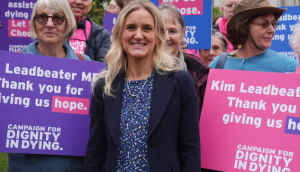Free votes on conscience matters are comparatively rare in the UK parliament. But they are almost always about issues of once-in-a-generation social change. Laws such as this need the utmost care because of the risk of unintended consequences. This is especially the case with the current assisted dying bill.
Writing from opposite benches as the father and mother of the house, our concerns are twofold, relating both to the process regarding the bill and its likely practice once implemented. Regarding the process, we have seen our fair share of bills over the years: some good, some bad. Whatever the merits of a bill, laws are always better if there is proper scrutiny and plenty of expert advice has been sought. This is particularly the case with private members’ bills, which often do not enjoy the independent scrutiny that government lawyers can offer.
When MPs last voted on this issue less than a decade ago, in 2015, Rob Marris published his private member’s bill a full seven weeks before MPs voted on the proposal at second reading, providing time for scrutiny and debate. In contrast, Kim Leadbeater’s bill was published just 18 days ahead of second reading.
The inadequacy of this timescale is heightened by the unprecedented number of new MPs. Parliament will have sat for just 12 weeks by the time MPs vote on what is, quite literally, a matter of life and death; many MPs are still relatively unfamiliar with normal parliamentary procedure, let alone for private members’ bills, of which this will be the first in this parliament. There is more than a suspicion that the pressure groups behind this proposed change have sought to take advantage of an inexperienced new parliament. Either way, the flawed process has been lamentable and wholly unacceptable for a matter of such importance.
It is not only parliamentary scrutiny that is being limited. There are significant legal and practical issues relating to assisted suicide. Last week, the former president of the high court family division, Sir James Munby, published detailed analysis of the bill’s judicial safeguards and concluded they fall “lamentably short”. He said: “Only those who believe implicitly in judicial omniscience and infallibility … can possibly have any confidence in the efficacy of what is proposed.” Equally importantly, more than 3,000 medical professionals have expressed concerns about the effect on their profession, were assisted dying to be made legal.
But our worry about this bill is not just about the rushed process. We are also concerned about how the new legislation would be implemented in practice, particularly as regards to vulnerable groups. The organisations campaigning for a change in the law have successfully used high-profile celebrities to promote the cause. We do not doubt their sincerity, and sympathise greatly with anyone experiencing the fear and pain that can sadly accompany terminal illness, but MPs must make laws based on their effect on every member of society, not just those whose profile gives them a prominent voice.
Evidence from elsewhere suggests those most at risk when assisted suicide is legalised are vulnerable minorities. Such people, unlike privileged elites who are used to exercising autonomy over every part of their lives and who can afford good-quality social and palliative care, are most likely to resign themselves to an assisted death against their will because they are unable to access the support they require.
Imagine the pensioner whose children cannot afford houses of their own watching her limited savings, earmarked for those children, disappearing on social care and so feeling a “duty to die”. And, sadly, it is not impossible to imagine a malevolent family member tacitly pressuring a disabled terminally ill relative to consider an assisted death, either because of the time-consuming and emotional burden their care has become, or even to be able to access the assets they will inherit more quickly. Or consider the elderly widow who has been hospitalised and worries she is taking up a valuable bed in an NHS under significant strain and would be better off dead.
Incidents such as these would be relatively rare, but the very act of legalising assisted suicide makes them possible. It is because, as demonstrated elsewhere, it is simply not possible to avoid such scenarios if assisted suicide were to be made legal that the only adequate safeguard is to keep the current law unchanged. Meanwhile, we should be investing instead in improving our health and social care system generally. And if there is one thing this debate has shone a light on, it is the urgent need to increase investment in palliative care.
The Guardian

